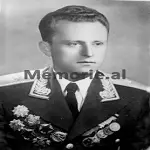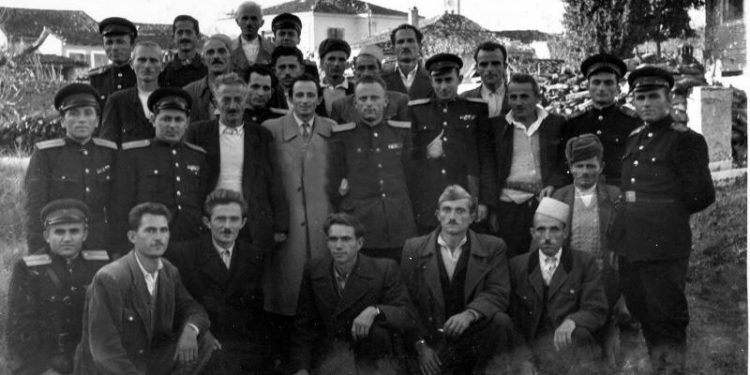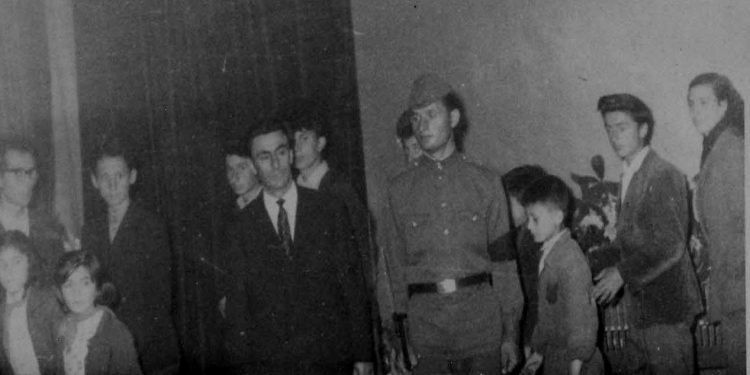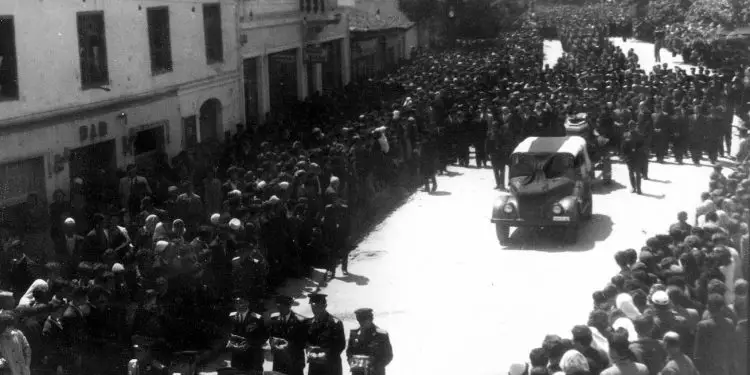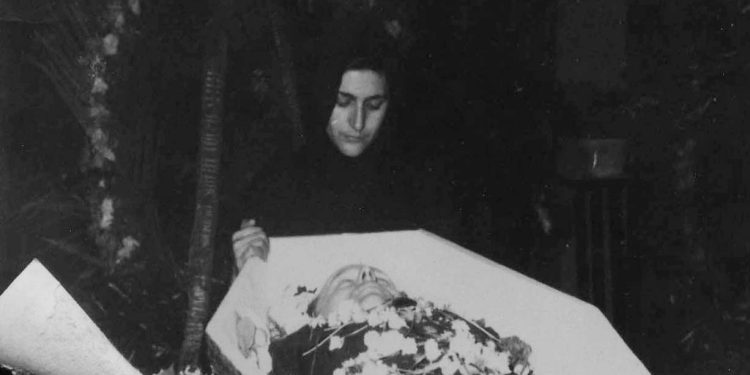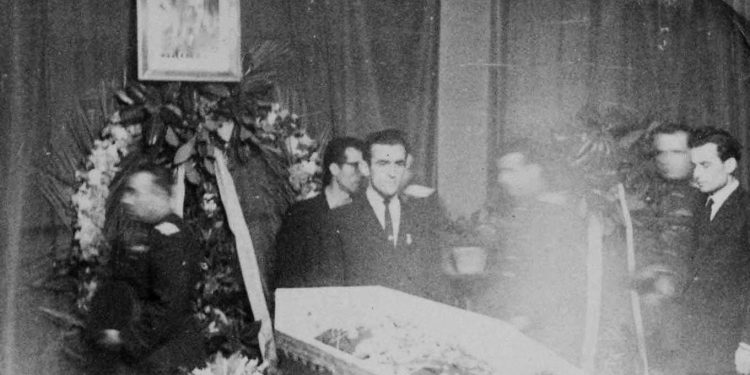By Rasim Bebo
Memorie.al / Bukurie Seiti, the wife of the former Cham general, Hilmi Seti, is now close to 80. For the first time, she publicly tells the few secrets about her husband, before and on the day that he, when he was the head of the Internal Affairs Branch of Shkodra, on April 26, 1960. He was only a short time promoted to general, and for 9 years of work in Shkodër, wrote his name in the memory of the northerners. The anxiety, the few conversations with her husband, the meeting with Enver Hoxha, the hostile group of Chams, Hilmi Seiti’s meeting with the Minister of the Interior, Lieutenant-General Kadri Hazbiu, just a few hours before he died, etc., are all that he remembers his wife, who for 44 years lived with the memory and enigma of her husband’s death, otherwise known as; the general of the Chams, Hilmi Seiti. Whispers through the corridors of the Ministry of the Interior, where she worked for years.
Ms. Beauty little has been written about your husband’s death. For years, you just kept quiet. Why?
– I was only 27 years old when my husband, Hilmi Seiti, left me. At that time, my eldest daughter, Vera, was 7 years old. The second, Violeta, two and a half years old, and the son, Agim, 17 months. I lost the man of my life, my love, everything I had. I did not understand anything! I had to raise children. Today I am old; I live with the memory of Hilmi.
– Why did Hilmiu die?
– Information in different ways has always tempted me. I don’t believe he died as they said at the time, from; “cerebral hemorrhage”.
– Even in the press it was hinted years ago that you personally have doubts about your husband’s death?
– It is the first time I speak for a newspaper. It should not be abused, with what I say, but I think that Hilmiu did not have any kind of illness. He didn’t suffer from heart disease or anything else. For years, people came to me and told me about what they knew. I also read in the newspapers that he was poisoned, or… I also doubt it. I want to know the truth about that man, who was not only my husband and the dearest man to this day, but he was very good, with thousands of people, who came and went to my house. My children and I have tried repeatedly to find a document. I would like to obey, so as not to remain in debt to that man, who in those years gave everything he could, for everyone he knew and did not know. Only, I can never forget the last conversation with him. After a while he died…!
– What did he tell you before he died?
– I remember that day every minute of my life. It was April 25, 1960. We lived in Shkodër, as Hilmiu was the head of the branch. It had been a year and a half since he had been promoted to general. In the morning, I told Hilmi that I was leaving for Tirana, because my father was old and I had to meet him. When I was in Tirana, they called me and told me that Hilmi was hospitalized. I will return to Shkodër soon. On the way, I don’t know why I was reproducing a conversation I had with him a few days ago.
When I arrived in Shkodër, they sent me to the hospital and I found Hilmiu in the last minutes of his life. He was just foaming at the mouth! “They gave me aspirin”, he said in my ear, so much so that I could not understand what he was telling me, “people with guns”, and then he died. A doctor, who had taken care of my husband, he is now dead, told me that; “Hilmi’s death is not common”! Not talking about what I heard from his friends, or from people I didn’t know.
– You said before that you remembered something from the unusual conversations with your husband. What was that conversation and how long ago did it take place?
– I must explain to you, first, that I am responsible for everything I speak. During those years that I lived with Hilmi, I had a defined role. I could never interfere in his affairs and I had taught myself to never ask him about what he had, successes or failures, much less about the problems, which for the mentality of the time were indisputable. But I remember one night, when he came home from work; he sat down on the sofa tired. He put his hands behind his head and said: “How are we going to get through, I’m in a difficult situation…”?! I didn’t understand what he was saying, but I immediately told him: “Whatever it is, we have children, and we will grow old and die together.”
– Have these fragments of conversations made you suspected his death?
Yes! Maybe many more, but what she had told me in the hospital, I couldn’t get out of my mind. So, after three months, I went and met Enver Hoxha. He welcomed me warmly.
– “Why did Hilmiu die?” – I told him. He shrugged his shoulders: “Hemorrhaging, say the doctors” – he told me. No more words!
As for Kadri Hazbiu, he came home again and again, together with his wife. All the people of the Party came, for years.
They told me that Kadri Hazbiu was the person who met Hilmi for the last time. It is said that the “Cham Group” was discussed. It seems that you asked Hilmi for cooperation on this matter at that time, when it was said that; “a hostile Cham group” had to be annihilated. After three months, Teme Sejko was arrested. Among others it was said; “The Cham group would connect with the US VI Fleet”. There were 32 arrested, 17 of them accused of being “Greek agents”.
– 44 years have passed since that time, until today. What do you think happened that day with Hilmiu?
– I think they poisoned him, but I don’t have any documents. I have nowhere to look for you!
– How did you know your husband?
– A man of right and only right. A man who sacrificed even himself in any case, in the name of truth or justice. When people who wanted to cross the border were brought to the offices of the Interior Branch, he asked them; why? Someone told him about the condition of the house, the lack of work, etc. He sent them to the Labor Offices and asked for help for them, not to bury them in prisons or execute them. An official who kept the doors of the Branch open, to solve people’s problems, a man who…when they asked him to sign perhaps some last document, against the Chams, or as it was called at that time, “The hostile group of Teme Sejko “, said that there is nothing true.
Testimonies of former high-ranking soldiers who knew Hilmi Seiti closely
When Halim Xhelo was in prison, he said in a close circle: “The meeting was held under the direction of Hysni Kapo in the Ministry of Interior, with Kadri Hazbi, Hilmi Seiti and me. It was said that we should create an ‘enemy group’ to tell the world that we do not bow to modern revisionists or American imperialism. And we think of calling it the ‘enemy group of Teme Sejko’. At this moment, Hilmi Seiti objects, leaves the meeting and goes to the Central Committee of PPSh, where he meets Enver Hoxha!
Enver Hoxha asked him: – ‘Hilmi, why do I look at you upset’?!
– ‘Comrade Hysni’ thinks of accusing Chameria of martyrdom, a hostile group’, – he replied.
– ‘Ah! Hysniu, does this with his head, without asking me?
Listen, Hilmi, do you trust the Party and me?
– ‘Yes, friend Enver’!
– ‘Go to work and work as you have been working’. This is how Halim Xhelo once expressed himself.
In the 19th volume of Enver Hoxha’s works, it is said: “For me, Teme Sejko’s hostile group is an enigma”. Albert Kotini writes: “On his (Hilmi’s) death, condolences were expressed with all sincere appreciations, among others Kadri Hazbiu, Mihallaq Ziçishti, Zoi Themeli, Sul Baholli, Teki Koloneci, Qazim Kondi, Halim Xhelo, Xhule Çiraku, Dilaver Poçi , Rexhep Kolli, etc. Who of these poisoned him? With what special order of Enver Hoxha, was it carried out?! By order of the party line, or of the underground Security?! Why Shkodra honored and mourned Hilmi Seiti, with the respect and greatness that only Fishta has done”?!
Skënder Vinçani, former Chief of Police for Shkodra District from 1953 to 1961, when he was the Head of the Internal Affairs Department, Mr. Hilmi Seiti, this colleague of his, tells me: “I had the honor to work for 7 years with Hilmiu. I knew him as a just, honest man and he performed his duty with the greatest moral purity. He did not imprison and deport anyone without facts and guilt. The employees of the entire Internal Department and the people of Shkodra admired him for his human qualities. His death for me is 100 percent suspicious, an alibi of a poisoning done to him.
Until the day he was poisoned, Hilmi was a man with an athletic body, in very good health. That day, the three of us, me, Mit’hati, (who was the deputy for Security), and Hilmiu himself, were walking in the streets of Shkodra. When 20.00 came, Hilmiu told me that there was a meeting of the District Party Bureau (that Hilmiu was a member of the Party Bureau), he told us that he had to go. Both of us, me and Mit’hat Zaçe, went home, while Hilmi went to the meeting of the party bureau. Later we found out that at the meeting of the Party Bureau, Hilmi had vomited, he got permission to vomit in the bathroom, and interrupted the meeting.
They wait as long as they wait and when it was too late, they found him lying unconscious in the bathroom, and he was no longer communicating. They take him urgently and admit him to Shkodra hospital. Mit’hat Zaçe and I went to the hospital. We found him writhing and foaming at the mouth until morning, when he died. The Ministry of Internal Affairs was notified. Kadri Hazbiu and some members of the Political Bureau of the Central Committee of PPSh came. They brought with them three teams of doctors from Tirana and Shkodra was full. They found him dead. They did an autopsy on his head.
One of the surgeons was Soviet and in the conclusion of the Tirana medical team, they concluded that; died of a ‘cerebral hemorrhage’, etc., ‘scientific’ arguments, but I didn’t believe it! If I spoke then, even as Nexhip’s brother that I was, I would suffer like Mit’hat Zaçe, who also suffered a suspicious death later. Why didn’t I believe it…?! How does the cerebral hemorrhage fall like this, when an hour before he was in excellent condition and did not complain of any illness?”
Rrahman Perllaku, “People’s Hero”, said: “I knew Hilmi very well. He was a very funny, capable, intelligent man and he loved Shkodra as much as the people of Shkodra. I fought with him, both in the 3rd Assault Brigade, and in the 5th Assault Division, and then deputy commissar of the 5th Assault Brigade. He was very communicative, with a manliness and intelligence that exalted him, and he had a perfect manner in society. We, the cadres of that time, appreciated Hilmi as one of the most cultured and able officers. In the war, he was one of the first in the battle; he did not know what fear was. In the organs, in the Internal Branch of Shkodra, as is known from above, this district had special features. Hilmiu manifested such features.
Quite communicative and kind to people. As an employee of the Ministry of Internal Affairs, he has come face to face with things with justice and truth. The information that came in, in particular what he understood or rather that he discovered as tendentious, Hilmiu dealt with. When he understood the malice of the employee of Internal Affairs, he told him: Go away! Don’t feel like I’m going to wear it where you don’t expect it! That’s how he prepared the way to take people by the neck, even for an unconscious chatter. With this point, I am telling a true event, which until today I have not told anyone. Several fugitives from Shkodra to Montenegro, who had made their way without being caught, were surrendered to Hilmi. After taking them into custody, he always released them keeping his promised words.
In another specific case, there were four fugitives who entered and left Montenegro, whenever they wanted, but they could never be caught. The only way for the Ministry of Internal Affairs was Hilmiu’s word with the fugitives, and this is what they asked Hilmiu to do, to meet them, talk to them, and assure them that they would not be affected if they surrendered himself. Hilmiu took it over. The four fugitives surrendered to Hilmiu, because they had proven his word and courage, and others before them. They were handed over to Hilmiu, he released them and let them go home. After two to three months, Hilmi was given an order by the MIA to arrest the four fugitives. He received orders from Kadri Hazbiu or Mihallaq Ziqishti, I don’t remember well. Hilmi, quite revolted, immediately came to Mehmet Shehu’s office and entered in a rage.
Mehmet Shehu jokingly told him:
– Hey, what’s wrong with you, damn it? – He actually respected Hilmi a lot. – Why did you come?
– I came to give you the hat and shoes, – said Hilmiu.
– Why what happened?
– Hilmi Seiti does not arrest those he has given allegiance to! Get it! (He had the spatulas in his hand). – I will never do this as long as I am alive, – he said and, in fact, as long as Hilmiu was alive, they were not arrested. No one in Shkodër was arrested before his death, for things that were not proven by Hilmiu. After Hilmiu came Feçor Shehu, so when Hilmiu died, I, as Rrahman, immediately went with Teme Sejko, to organize his funeral. I have not seen a burial of such size in Shkodër, after that of Gjergj Fishta. The women were crying on the balcony, the whole of Shkodra was crying. Me and Temen, we went at 23.00 that day. Hilmi’s death has remained enigmatic for me”.
Muhamer Spahiu, a well-respected and persecuted veteran, among others that we mentioned above, adds that; “Hilmi Seiti was the vanguard of the disappearance of Teme Sejko and other Chams in the years ’60-’61. It was a real Hoxha-Hazbiu scenario, which we have suffered for years”.
FUNERAL
Hypocrisy from those who killed him! Respect and pain from those who loved him: the wonderful people of Shkodra. Hypocrites and murderers, face to face with the grave of Hilmi Seiti, “scumbags” and “brutes” of Albanian society, from the vice-chairman of the Council of Ministers, members of the Political Bureau and the Central Committee, as; Kadri Hazbiu, Mihallaq Zicishti, Sul Baholli, etc., who made his obituary on April 28, 1960. From these lines, Kadri Hazbiu breaks off and speaks in front of Hilmi’s grave: “Your determination, intelligence, ardent patriotism, boundless love to the people, the party and the Soviet Union, all your good qualities, we will meet them every day in the footsteps of your work, and future generations will be educated with them, to serve the people and the Motherland faithfully”.
Similarly, near Hilmi’s grave, the commemorative procession listened to the speech of comrade Sul Baholli, first secretary of the Shkodra district Party Committee. “The people of Shkodra, with tens and thousands of people, had come to escort the body of Hilmi Seiti. They were coming to escort their son, who for years had protected them from the unjust persecution of the biography hunt, the class war, who became victims. So, it was a barricade, and they were feeling this manhood and honesty, which was being buried precisely for this barricade”
Enver Hoxha and Kadri Hazbiu, who had Shkodra as a “reserve” to fill political prisons, from “reactionaries” and anti-communists, eliminated Hilmi Seiti and paved the way for the executioner Feçor Shehu. The plan of arrests with the arrival of Feçor Shehu was carried out with imprisonments, espionage and deportations throughout Shkodra. Besa, virility, honesty of the Hilmi Seiti Cham, conquered such a heart as Shkodra. The respect and honor of Çameria, Hilmi Seiti, was in the bay of Shkodra, because he was also her son.
BIOGRAPHY OF HILMI SEIT
Hilmi Seiti was born on November 15, 1922, in the village of Spatar in Chameria. He comes from a patriotic peasant family and was a supporter of the Albanian and Greek liberation movements. At a young age, he became an orphan and was sent on a scholarship to the dormitory “Çamëria” in Sarandë, then continued high school in Gjirokastër and Shkodër. It stands out for high results, as well as friendliness with friends. From 1938, he was a member of the Communist Group of Shkodra and with the formation of the Communist Party, he became its member. He finds war in high school and for anti-fascist activity he is arrested and exiled in Bari, Italy.
In 1942, he returned to Albania and in 1943, he joined the ranks of the National Liberation Army, performing the duties of deputy commissioner of the 5th and 3rd Assault Brigades. He participated in the liberation of Kosovo. After the end of the war, in 1946 he worked in the State Plan Commission as head of the branch. In 1949, he was appointed and served in the bodies of the Ministry of Internal Affairs, with the rank of major. In 1953, he was appointed head of the Internal Affairs Branch of Shkodra District. In 1959, Hilmiu was promoted to “Major General”.
For outstanding merits in the war and at work, Hilmiu is decorated with five medals and six orders, such as: “Order of the Flag.”Order of Skanderbeg” of the III class, “Order of Bravery”, “Order of Military Service”, “Order of the Red Star”, as well as many medals, etc. On April 26, 1960, at the age of 38, Hilmiu died in Shkodra, unexpectedly, during a work meeting, poisoned, as we described above. The people of Shkodra and the whole north escorted Hilmi with a grand ceremony and great respect, to the last residence. Memorie.al
(Materials: “Çamëria” newspaper, article entitled, “Mysterious death of the Cham general”. May 2004, p. 11. Albert Kotini, “Chamëria denounces”, 2002 edition, pages 51-53. Notes of the time).




